Corsair Performance Series Pro (256GB) Review
by Kristian Vättö on May 14, 2012 9:10 AM EST- Posted in
- Storage
- SSDs
- Corsair
- Marvell
- Corsair Performance Pro
Random Read/Write Speed
The four corners of SSD performance are as follows: random read, random write, sequential read and sequential write speed. Random accesses are generally small in size, while sequential accesses tend to be larger and thus we have the four Iometer tests we use in all of our reviews. Our first test writes 4KB in a completely random pattern over an 8GB space of the drive to simulate the sort of random access that you'd see on an OS drive (even this is more stressful than a normal desktop user would see).
We perform three concurrent IOs and run the test for 3 minutes. The results reported are in average MB/s over the entire time. We use both standard pseudo randomly generated data for each write as well as fully random data to show you both the maximum and minimum performance offered by SandForce based drives in these tests. The average performance of SF drives will likely be somewhere in between the two values for each drive you see in the graphs. For an understanding of why this matters, read our original SandForce article.
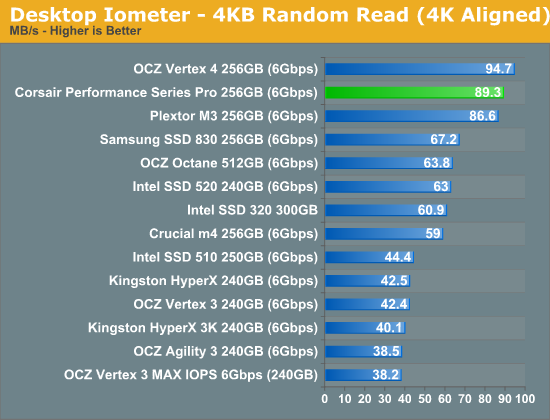
Performance Pro's random read performance is slightly faster than Plextor's M3's but there is essentially no difference. In general the random read performance is excellent, as expected.
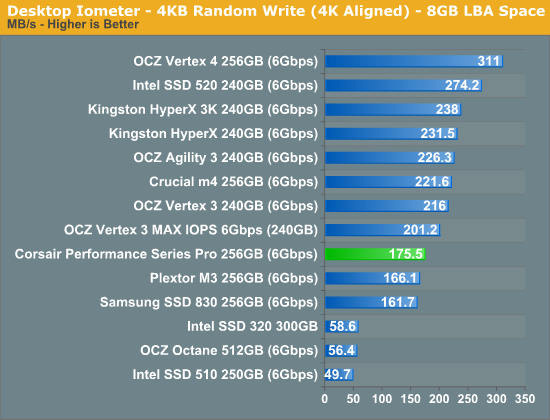
Random write performance is not top-notch but still ~6% faster than what Plextor's M3 provides.
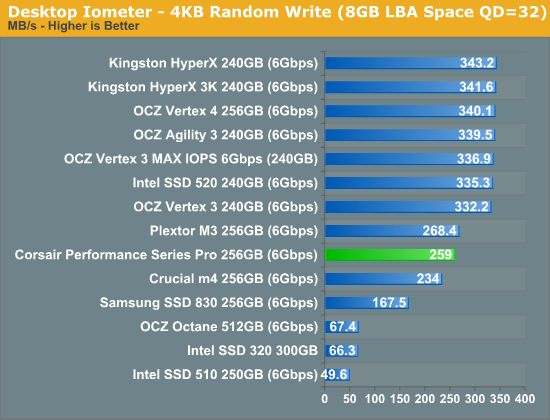
Increasing the queue depth shows an increase in random write performance but this time the M3 is a bit faster. We are only looking at a difference of ~4% though, and it should be noted that most workloads don't use queue depths higher than 5.
Sequential Read/Write Speed
To measure sequential performance we ran a one minute long 128KB sequential test over the entire span of the drive at a queue depth of 1. The results reported are in average MB/s over the entire test length.
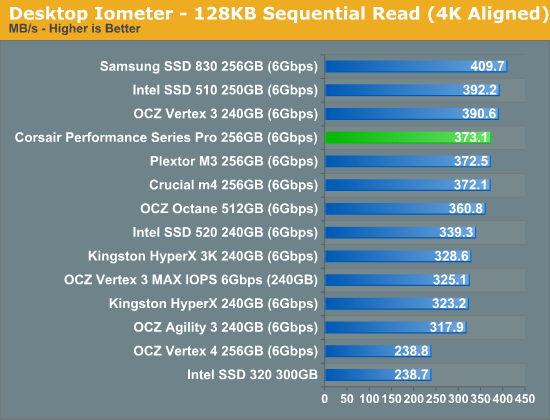
Again, identical performance with Plextor M3 and this time Crucial's m4 joins the chorus as well.
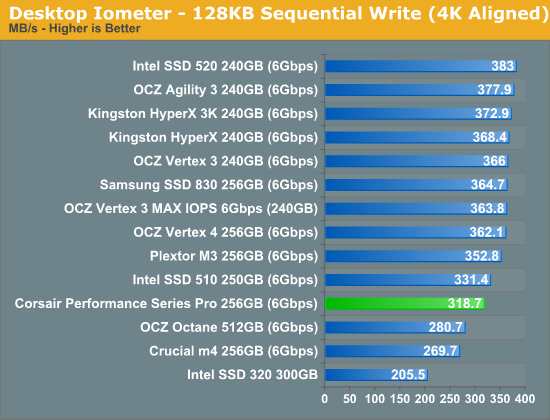
Sequential write introduces some surprises. Plextor M3 is 34MB/s (10.7%) faster here while in other tests the two were much closer to each other. However, one shouldn't pay too much attention to just one test and our Storage Suites should give a much better look at real world performance.










41 Comments
View All Comments
Kristian Vättö - Monday, May 14, 2012 - link
I've had Plextor M3 Pro for a couple of weeks now and review should be up next week at the latest. I didn't have all data yet so couldn't include it in the charts, plus it might have stolen the spotlight so I decided to save all data for a dedicated review.Mathieu Bourgie - Friday, May 25, 2012 - link
Any update on this? I'm dying to see a AT's review of the M3 Pro :Djwilliams4200 - Tuesday, May 29, 2012 - link
Well, "next week" has come and gone.I see that you have the M3P data in the benchmark database, but where is the review article?
Voldenuit - Monday, May 14, 2012 - link
Hi Kristian,Thanks for the review. Could AT please post the physical measurements of the drive? Some laptops are moving to the 7mm thick form factor and will not accept standard 9.5mm thick 2.5" drives.
Kristian Vättö - Monday, May 14, 2012 - link
It's 9.5mm thick, like most 2.5" drives. I added it to the article so it's no longer unclear :-)Voldenuit - Monday, May 14, 2012 - link
Thanks!How's that for awesome-fast service!
GrizzledYoungMan - Monday, May 14, 2012 - link
With the Samsung 830 going for nearly a dollar a gig at the critical 128 gig capacity, I really can't imagine why someone would buy a competitor's SSD. They're already way ahead of most on performance and reliability, for much less than the vast majority of alternatives.Interesting how that old Intel controller in the 320 is still kicking ass where it counts (random reads, latency, IOs at low queue depths). I really feel like most SSDs - all of them, really, besides the 830 and 320 - are designed more to score well in benchmarks than to meet the performance needs of desktop/workstation users.
Really glad we have Anand and his colleagues working on understanding this stuff.
zcat - Monday, May 14, 2012 - link
Indeed. I finally sprung for the 256G Samsung 830 last Friday, since it was on sale for only $235 w/ free shipping, and because it's still "best in class" overall. The Crucial m4 was a close 2nd choice due to its reliability rep as well, but the write speeds suffer a bit. (Thanks for the SSD comparison benches AT!)GrizzledYoungMan - Monday, May 14, 2012 - link
Trust me, you'll be really glad you didn't go for the M4. After my old Vertex (first gen, Indilinx! haha) was dying, I replaced it first with a 128gb M4, largely because of its reputation for reliability.Man, was that a mistake. I was on FW 0309 (which had been issued in a hurry to correct a BSOD issue created by the last FW update) and the thing had major issues. Stuttering, hanging, inability to resume from sleep and so on. The Windows event manager was lit up red like a Christmas tree, and this was with a fresh install on a Lynnfield based machine that worked beautifully with my old Vertex.
Turns out the thing had major, unacknowledged (outside of some hard to find forum posts) compatibility issues with Intel's RST an a number of power management features in Windows 7. I guess Intel and Microsoft are really obscure little companies whose products don't merit compatibility testing? Beats me.
zcat - Monday, May 14, 2012 - link
Hah. I'm also replacing a 1st gen OCZ Vertex. :)SMART says it has only 39% of its (writable) life left after about 2.5 years of use:
209 Remaining_Lifetime_Perc 0x0000 --- --- --- Old_age Offline - 39